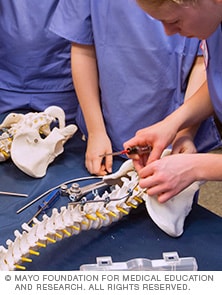Curriculum
Clinical training
Your clinical training in the Orthopedic Surgery Residency covers all subspecialty areas of orthopedics, including:
- Adult reconstruction and its subdivisions
- Foot and ankle surgery
- Hand and upper extremity surgery
- Microvascular surgery
- Orthopedic oncology
- Orthopedic trauma
- Pediatric orthopedics
- Spine surgery
- Sports medicine
During your residency, you serve as a team physician for one of the local high schools. You participate in all aspects of care for the athletes, including pre-participation examination, training, decision-making about continuing play, evaluation and treatment of injuries, and rehabilitation.
Additionally, while on the sports medicine rotation, you assist faculty in the care of an NCAA Division I college sports team.
Rotation schedule
PGY-1
Each of the following rotations are one month in length:
- Resident boot camp
- Trauma surgery
- Medical-surgical ICU
- Vascular surgery
- Plastic surgery
- Neurosurgery
- Adult reconstruction
- Musculoskeletal trauma surgery
- Upper extremity
- Foot and ankle
- Pediatrics
- Spine
| Rotation | Length |
|---|---|
| Musculoskeletal trauma | 3 months |
| Adult reconstruction | 3 months |
| Musculoskeletal oncology | 3 months |
| Sports orthopedics | 3 months |
| Rotation | Length |
|---|---|
| Musculoskeletal trauma | 3 months |
| Hand | 3 months |
| Pediatric orthopedics | 3 months |
| Foot and ankle | 3 months |
| Rotation | Length |
|---|---|
| Musculoskeletal trauma | 3 months |
| Shoulder | 3 months |
| Spine surgery | 3 months |
| Electives | 3 months |
| Rotation | Length |
|---|---|
| Musculoskeletal trauma | 3 months |
| Adult reconstruction | 3 months |
| Pediatric orthopedics | 3 months |
| Sports orthopedics | 3 months |
Rotation descriptions

Nonorthopedic rotations
During the first year of the Orthopedic Surgery Residency, you have six months in nonorthopedic rotations that help you develop knowledge and skills in areas associated with orthopedics.
These rotations include:
- Resident boot camp
- Trauma surgery
- Neurosurgery
- Medical-surgical ICU
- Plastic surgery
- Vascular surgery
Basic science
During the course of the five years of residency, you are excused from clinical responsibilities two afternoons a week for two hours while you complete the basic and clinical science curriculum.
This curriculum includes:
- Didactic lectures presented by residents, orthopedic staff members and faculty from allied fields
- Cadaver sessions
- Extensive reading
- Clinical conferences
- Opportunities to perform clinically relevant research
Topics include a broad spectrum of science related to the musculoskeletal system, such as:
- Anatomy
- Biochemistry
- Biomechanics
- Immunology
- Infectious diseases
- Microbiology
- Microvascular surgery
- Molecular biology
- Orthotics
- Pathology
- Physiology
- Prosthetics
- Rheumatology
These topics are reinforced with laboratory experiences such as anatomy (cadaver dissection), motor skills and microvascular surgery laboratories. You also learn about orthopedic implants and how they are used in trauma and reconstructive surgery.
Off-site rotations
Several of the rotations during the residency are at off-campus locations:
- Trauma Surgery (PGY-1) — HonorHealth, Osborn location
- Orthopedic Trauma (PGY-1 through PGY-5) — HonorHealth, Osborn location; and Sonoran Orthopaedic Trauma Surgeons
- Orthopedic Spine (PGY-1 and PGY-4) — HonorHealth, Shea location; and Sonoran Spine
- Pediatric Orthopedics (PGY-1, PGY-3, PGY-5) — Phoenix Children's Hospital
Call frequency
Your call schedule is different for each rotation. Mayo Clinic College of Medicine and Science follows the recommendations of the Accreditation Council for Graduate Medical Education (ACGME).
Research training
You are expected to perform annual research under the direction of supervising faculty.
Didactic training
Clinical conferences, seminars, small discussion groups, journal clubs and one-on-one instruction are integral parts of the Orthopedic Surgery Residency and are required elements of the residency curriculum.
Teaching opportunities
Opportunities are available for residents to teach rotating medical students and junior residents.
Evaluation
To ensure that you acquire adequate knowledge and develop the appropriate technical skills to meet program expectations, your performance is monitored carefully during the Orthopedic Surgery Residency. You are formally evaluated by supervising faculty members after each clinical rotation and meet with the program director semiannually to review these evaluations. In addition, you regularly evaluate the faculty to confirm that your educational needs are being met.